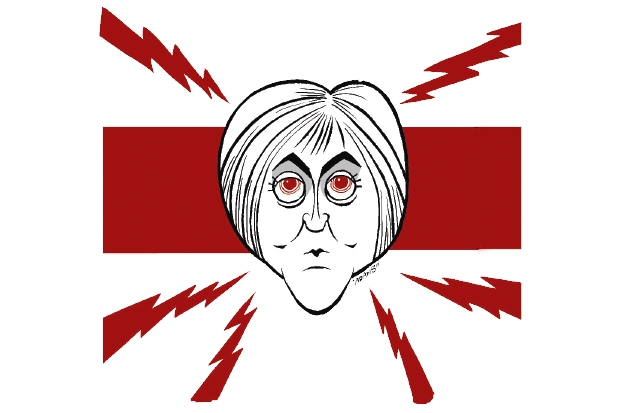Joanna Cherry is out as the SNP’s Home Office spokeswoman at Westminster. The QC, who also shadowed the Justice Secretary, announced on Twitter that she had been ‘sacked’ from the nationalist frontbench.
Her departure comes as part of a rejigging of what the party terms ‘the real opposition’. There is some established talent there (Alison Thewliss at Treasury, Alyn Smith at foreign affairs, Stewart McDonald at defence) and some fresh blood in the form of 2019-intake MP Stephen Flynn, bumped up from junior Treasury spokesman to ‘Shadow Secretary of State for Business, Energy and Industrial Strategy’. (The SNP refers to all its frontbenchers as shadow secretaries of state, which is so ambitious as to be endearing).
The New SNP is personality-led, elite-driven, and ruled by a doctrine that cannot be found anywhere in the party’s constitution
Why, though, have they dispensed with the services of a woman widely regarded as the party’s strongest performer at Westminster? A forensic parliamentary interrogator, especially of Priti Patel? One of the litigants who defeated the government on prorogation at the Supreme Court and forced the reconvening of parliament?
Why indeed. Well, there are three strikes against Cherry. One, she was and remains an outspoken supporter of Alex Salmond, the predecessor, mentor and, until a few years ago, iron-tight ally of Nicola Sturgeon. In 2018, Sturgeon’s government launched an investigation into allegations of sexual harassment against Salmond but was ordered to pay his legal fees after the Court of Session ruled the probe had been ‘unlawful’, ‘procedurally unfair’ and ‘tainted by apparent bias’. Salmond was subsequently tried on 13 charges of sexual assault but was cleared on all counts by a jury at the High Court in Edinburgh. A Scottish parliamentary inquiry into how the Scottish government conducted itself is now in its final stages and Salmond is expected to appear before it as a witness next week.
The second strike against Cherry is more straightforward: she is sometimes talked up as a potential successor or challenger to Sturgeon as SNP leader. Cherry tried to seek selection for a Scottish parliament seat last year but dropped out of the race after a party rule change that would have forced her to quit as an MP first.
But perhaps Cherry’s biggest sin is that she is a gender-critical feminist. She has challenged the capture of the SNP by trans rights activists (referred to by internal foes as ‘the wokies’), which has seen the party pursue a host of previously fringe policies, from removing medical experts from the gender identity process to allowing biological males to count as ‘female’ appointments to public boards. Nicola Sturgeon in particular has embraced this ideology with the fervour of a woman who really wants to be called ‘progressive’ by Gen-Z Twitter activists with blue hair. After a number of younger members quit the SNP last week, Sturgeon put out a video pleading with them to ‘come home where you belong’ while the party issued a statement saying: ‘We are sorry that we’ve let you down and today pledge ourselves to change’. This came amid a string of leaks to the grassroots pro-independence blog ‘Wings over Scotland’ documenting the next stages of what old-guard nationalists consider the woke takeover of the SNP.
Announcing ‘his’ reshuffle today, Sturgeon’s Westminster footman Ian Blackford said ‘team working and cooperation are key to ensure results’, a statement that doesn’t require much reading between the lines. It speaks to an intolerance of dissent inside the SNP, a party which once prided itself on its love of a good rammy. The SNP under Sturgeon is infinitely more presidential, managerial, and clique-driven than New Labour under Tony Blair. (At least New Labour believed in — and, more importantly, did — things.)
We might have to borrow similar phrasing when talking about Nicola Sturgeon’s party (and it decidedly is her party). The Old SNP (1934–2014) went through major upheavals and ideological pivots under the ascendancy of one faction or another, from sovereigntism to ‘Independence in Europe’, economic and social rightishness to economic and social leftishness, but it remained a party in which the grassroots still mattered and internal debate was (grudgingly) tolerated.
Under Sturgeon, the New SNP (2014-present) is personality-led, elite-driven, and ruled by a doctrine that cannot be found anywhere in the party’s constitution (yet) but which holds more sway than fusty old rulebooks drawn up in fusty old conference halls and voted on by fusty old delegates.
It is a doctrine I call ‘coercive progressivism’ and is a total ideology of identity, culture and values that places these matters, rather than economic or social affairs, at the heart of politics and seeks to enforce its marginal orthodoxy on the mainstream by way of law, social pressure and institutional capture. It is, at root, a post-liberal and post-democratic movement. And it brooks not a peep of disagreement, which is why the foremost talent on the SNP frontbench is no longer on the SNP frontbench.







Comments